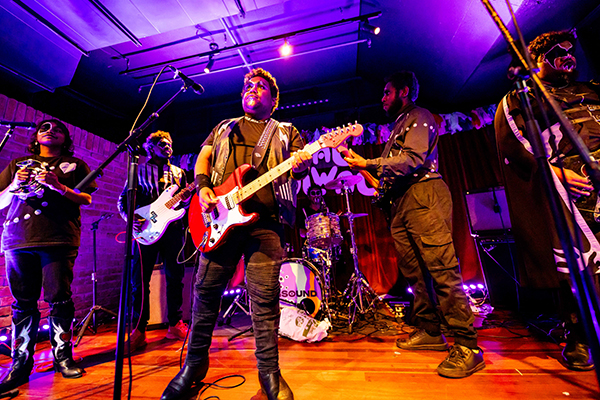Out of Reach
THE FINANCIAL AND CULTURAL COST TO FIRST NATIONS MUSICIANS IN THE NT
This special feature is a collaboration between Off The Leash and The Music Writer's Lab for Ausmusic Month
Pursuing a career in music is a tough gig. The constant hustle to get your music out and into the world, and the many, many hats you have to wear – promoter, marketer, content creator, administrator, and bookkeeper, to list a few.
By Tierney White
IF YOU’RE A musician based in the Northern Territory, making it big in music is almost out of reach due to financial constraints and a lower population. On the flip side, high travel costs often strike the NT from the itineraries of travellers, many opting for a trip to Bali instead. High travel costs also burn the hip pockets of musos keen to tap into a Territory audience.
Travel and accommodation costs to head “down south” to perform leave many a Territory muso out of pocket, and often, viewing it as not [financially] worth it. They rely on sheer determination and the love of the craft to make it work. In fact, many hoping to make their mark in the music world eventually leave the NT to pursue their dreams in southern states.
For the NT’s First Nations musicians – living in remote communities where the internet is blotchy, English is not the first language, and logistics to travel are complex – it’s even worse.
The Bush Music Fund (BMF) was launched this year to act as a bridge between remote communities and the rest of the country. According to their website, the BMF aims "to increase the representation of First Nations artists in the contemporary music industry by increasing the opportunities and advocating for support systems to further their careers."
The BMF was instrumental in getting Mulga Bore Hard Rock, a band of teens from the small community of Mulga Bore, to Meanjin/Brisbane to showcase at this year’s BIGSOUND. But despite their rapidly rising star, it wasn’t easy to get there.
“It took a lot to get here … Normally, on the road, there’s nine of us. A stage manager, myself, an Aunty that travels with us, and there’s six in the band. To get the nine of us [to BIGSOUND], I had to raise 20 grand. And just getting the band to the airport … that accessibility is difficult,” says manager Rebecca McLean.
After taking out the NT Battle of the School Bands competition, the band was handpicked by KISS to support their gig on the Gold Coast in 2022. Lead singer Alvin Manfong (aka Thunderchild), who’s joined by his cousins and siblings in the band, says it was unreal.
“That was amazing for me, one hell of an opportunity. We met Tumbleweed, Wolfmother, and KISS. It feels good. Being on KISS’ stage, watching them videos as kids, and now I’m here on the KISS stage!”
A Mulga Bore gig is a memorable one. Led by Manfong, who at just 19 years already has a knack for audience participation in a fun I-say-jump-you-say-how-high kind of way, is proud to share their music and, importantly, their language.
“Those language songs are from my uncle, and more language songs coming. I’ve written one, I’ll try [to write more]. He wrote [that song] way back when we were born,” he says.

In addition to exorbitant financial costs, there’s also a huge cultural cost that First Nations creatives experience. Jack Latimore is a Birpai-Thungutti man with years of experience covering Indigenous affairs and music throughout his journalism career. The former Managing Editor of NITV has seen the devastating effects of people being off-Country, with some dire health outcomes.
“It’s very taxing. Being away from mob … just being away from your support networks. That takes a toll which is as big as the financial costs.”
Arian Pearson is a Yolŋu man from Yirrkala in North-East Arnhem Land, and a former member of band East Journey. He’s also co-founder and director of the Bush Music Fund, and says there are many ways First Nations musicians are impacted.
“Connection to Country plays a vital role in their identity, music, and wellbeing. Being off-Country for long tours can cause feelings of displacement and can impact on their mental and emotional health. This is why it's so important that they are supported in this space,” he says.
“Remote musicians have responsibilities to their communities, including participating in ceremonies, caring for the Country, and other family obligations. Touring can sometimes create conflicts of these obligations, people from remote areas often feel they are not putting their traditional roles first.
“Many First Nations artists don't have access to support systems, managers, mentors; people who can help them whilst touring. They rely on these people to feel safe and respected and nurtured through certain experiences in their musical careers.”
Stage production Big Names, No Blankets, presented by ILBIJERRI Theatre Company, took the country by storm this year. It tells the story of Warumpi Band from Papunya, a small remote community about 240 clicks north-west of Mparntwe/Alice Springs.
The first rock’n’roll band to sing in Aboriginal languages rose to fame in the 1980s and toured the world. But one by one, the band members left to be back on Country, with their mob, their culture; the longing to be home outweighing any benefit of being a star.
So, what’s the answer? If, at the bare minimum, the internet was more accessible, if there were more programs in place at a government level (like the BMF, which is backed by philanthropic givers) to support First Nations artists to travel and learn different aspects of the music biz, it would certainly help. Pearson says sharing culture and stories is important for Australia’s collective culture.
“It's important we continue to support artists and musicians on their creative journey. Touring offers them a platform for them to continue to share their culture, stories which can educate others about Aboriginal heritage, culture, and our cultural values.”
Despite tricky logistics, and financial and cultural costs, Manfong says his family band is dreaming big. They want to take their music all around Australia, then take on the world.
“A big jet, Aboriginal flag on the side, and Mulga Bore Hard Rock.”
Now, wouldn’t that be nice?
INFO bushmusicfund.org
Header & thumbnail: Mulga Bore Hard Rock. Photo: Ivan Trigo Miras
Inset: Mulga Bore Hard Rock at BIGSOUND. Photo: Lachie Douglas
